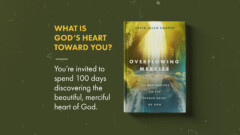This one began with a conversation, with a statement within that conversation: “Christians don’t get to hold a grudge!” It’s just not an option, not a vice we can allow ourselves. But it’s not the only thing Christians don’t get to do. There are other kinds of behavior that God rules out, that God describes as being nothing less than sinful rebellion. Sadly, this doesn’t always stop us. Some of these behaviors continue despite God’s insistence that they are unfittinng for his children. Here are a few I’ve encountered lately in life, family, and ministry.
Christians don’t get to hold a grudge. You’ve got two options when a person commits an offense against you: You can overlook it or you can confront it (Proverbs 19:11, Matthew 18:15-17). You either let it go without ever holding it against the other person or you confront it in love and bring it to a healthy resolution. But you can never hold on to it in anger and bitterness. That’s simply not an option for the believer.
Christians don’t get to withhold forgiveness. When a person seeks your forgiveness you are duty bound to forgive him (Luke 17:1-4). Even if that person sins against you repeatedly and seeks forgiveness each time, you are equally duty bound to extend forgiveness. You don’t get to decide that the person needs to suffer for a while first, that the person deserves the silent treatment, or that the person isn’t sufficiently sincere. You need to extend forgiveness as freely and immediately as God has extended forgiveness to you.
God measures wealth not by what is accumulated but by what is put toward his work.
Christians don’t get to hoard their wealth. Christians can and should earn money. When given the opportunity, Christians can and should earn more rather than less money—there’s no intrinsic value in poverty and no intrinsic trouble in wealth. But Christians are not to hoard their wealth (Mark 10:23). Rather, Christians are to understand that wealth is a means to God’s ends. This includes provision for self and family and reasonable preparation for the future, but it also includes resourcing God’s mission here and now. God measures wealth not by what is accumulated but by what is put toward his work.
Christians don’t get to complain. Grumbling is a favorite sin to many. Some go so far as to treat it as a kind of virtue—just think of late-night television and the grumbling that goes on there under the banner of comedy. But the Bible reveals grumbling as a problem of the heart and a behavior that is unsuited to the Christian. Rather, we are told to “do all things without grumbling” (Philippians 2:14; see also 1 Peter 4:9, James 4:1-3). Rather than grumble you are to pray and to give thanks to God for his providence, no matter the circumstances.
Christians don’t get to go it alone. There is an independent streak deep within the human heart, a desire to go it alone in life. Yet Christians are commanded to form themselves into churches, into communities of believers who share life together (Hebrews 10:25). Lone Christians are disobedient Christians who refuse to take hold of one of God’s most important means of grace. Living outside a community of Christians is not a legitimate option for the Christian.
Christians don’t get to be a thorn in their pastor’s side. So many churches have that person or those few people who take it upon themselves to keep the pastor honest, to challenge his every move, to refuse to give him the benefit of the doubt. They see devil’s advocacy as their ministry within the church—their ministry of restraint upon the church’s leaders. But the Bible allows no such “ministry.” Rather, “Obey your leaders and submit to them, for they are keeping watch over your souls, as those who will have to give an account. Let them do this with joy and not with groaning, for that would be of no advantage to you” (Hebrews 13:17).
Christians don’t get to be unproductive. Laziness and lack of productivity are rarely far from us. It’s hard to be active and easy to be distracted. There’s always a reason to veer away from our responsibilities and toward entertainment. But Christians don’t get to be lazy. They don’t get to be unproductive. Productivity is a word that is maligned and misunderstood, yet when defined correctly it is the heart of the Christian life. To be productive according to the best definition of the term is to bring glory to God by doing good for others (Galatians 6:10, Hebrews 10:24). That’s what you’re here for!
Every sin, no matter how small or precious it seems, is to be confronted and destroyed.
Christians don’t get to have a pet sin. Make no mistake, it is grueling work to put sin to death. It can be difficult and discouraging. It is especially tough work when it comes to putting those pet sins to death, those sins you have grown to love and coddle over a lifetime (Colossians 3:5). But as a Christian you do not get to have a pet sin, a peccadillo, a sin you refuse to confront through the power of the Holy Spirit. Every sin, no matter how small or precious it seems, is to be confronted and destroyed.
Christians don’t get to be anxious. Many Christians think worrying and fretting is something less than a sin. Some would go so far as to think that worry is necessary, as if refusing to worry about life’s cares and sorrows indicates apathy. But actually, a refusal to worry indicates confidence in the will of God. God tells his people not to worry, not to be anxious, but to instead entrust all things to his kind and good providence (Philippians 4:6-7). Anxiety is not a legitimate option for the Christian.
Christians don’t get to speak evil of one another. We know that we can’t go around gossiping about one another, recklessly spreading malicious information or pseudo-facts. But we still find ways of doing it, whether it’s in the guise of a prayer request, a plea for help, or a joke. As a Christian you need to be aware of your tendency to speak evil of others, to misuse your words (James 3:6, 9). And you need to guard yourself against speaking of others in a way you wouldn’t if you were face-to-face. Words are to be used only to build up and never to cut up.
These are all things—just a few of the things—Christians don’t get to do. These are things we don’t get to do because they are associated with godlessness rather than godliness, with sin rather than salvation. In every case God has freed us by his gospel to a new and better way of living—a way of love, forgiveness, generosity, encouragement, community, submission, industry, purity, and freedom. We don’t get to do those things that would only ever harm us and the people around us.










